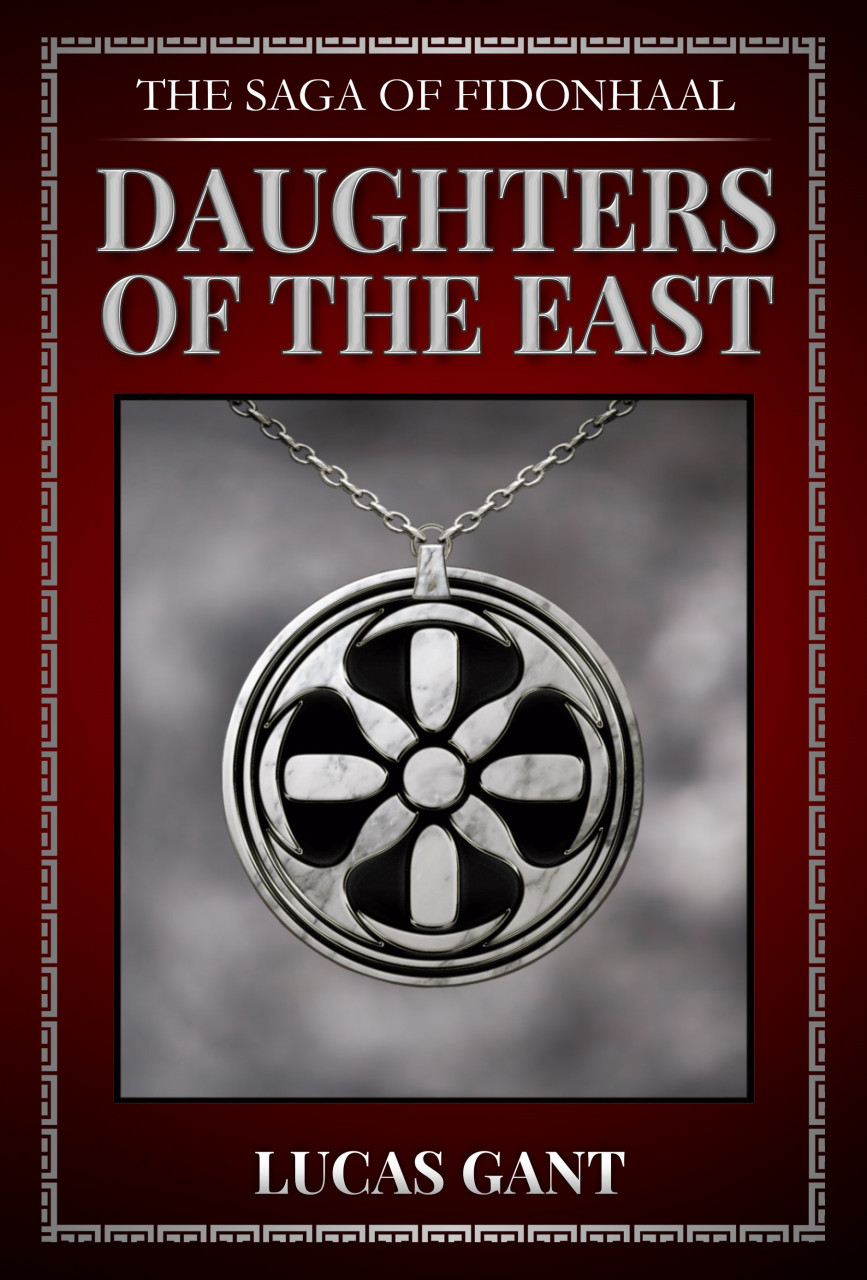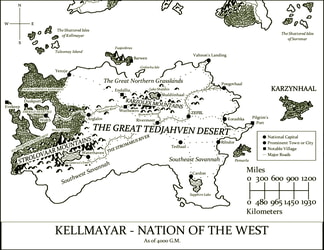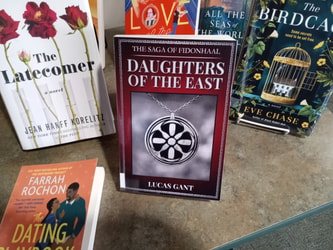Sign In
CloseThe Saga of Fidonhaal: Daughters of the East - PREVIEW 4 by WulfeVanDerKross

DONOVAN VELAVIS stood beside his father, Jonathan, looking at the pyre on which his mother and baby sister lay. The sun had risen to its peak, and the light of the early winter’s clear noon cast a brilliant diamond sparkle onto the blankets of snow that covered the town of Therohl. The Balon boy, tired and numbed from the past two days of grieving, let his sight rove across the cloudless sky, the blue of which matched the young eyes that beheld it. He reflected on how it would soon be marred by the smoke of a funeral pyre. Distraught that he could bring himself to weep no more, he returned his gaze to his mother and sister.
Envah, Donovan’s mother, lay in the chillingly beautiful peace of the dead. Her eyes, the same color as her son’s, were now closed forever as the soul behind them had departed to Onuhaal two days ago. Sani, his sister, lay cradled in her mother’s arms, as was the custom for funerals that mourned a mother and newborn that were lost to problems during birth.
Donovan thought back on the joy that his father and mother had shared in the past months, and the anticipation he himself had for the prospect of an addition to the family. There was an even greater amount of excitement the previous week, when all wondered if the baby would be born on Sardonmay. The babe ended up missing the new year’s start by two days, but when the time came at last, happiness filled the house. Thus Donovan, pacing eagerly in the entry hall of the house and just outside its doors, was taken completely aback when his father, with a tear-streaked face of dread and grief, urged him to hurry inside to his mother. He ran to his mother’s bedside, the doctor and priestess looking on sadly, as she tearfully cradled Sani’s lifeless little body as she herself began to slip away. She implored Donovan to not resent his little sister, or her memory, for taking her mother with her when she had already flown to Onu’s side. Donovan, sobbing, swore that he would never look on this memory with anger, as he watched the blood from his mother spreading steadily over the sheets on which she lay.
“Please, Mama,” wept Donovan, “I want to ask just one thing before you go. Please, would you and Sani ask Onu to keep me and Papa strong and happy? I’ll do what I can, but I don’t think I have what it takes to go on by myself.”
Donovan would hold faith all his days that the souls of his mother and sister heard his request and brought it to the Maker, for an answer never passed from Envah’s lips before she passed from the world. Unable to brace against the sudden loss any longer, he collapsed to the floor, clinging to the bedside, crying freely as he yielded to grief. His father soon came in, sobbing his regret for not being strong enough to see his wife off in her last moments. He lifted up his son and embraced him as the priestess told him of Donovan’s final request to his mother.
“May they ask Onu to bless you doubly, my boy,” wept Jonathan, “for you did what I could not.”
Now, Donovan’s reflection was interrupted by a light gust of biting cold, which stirred the settled snow and lifted some into the winds. The lad had now seen eleven Sorrenarn winters, knowing his beloved land of the North to be renowned as the home of the coldest climes. But this was the coldest he had ever felt, and upsetting as the sensation was, he was nevertheless thankful for it, as it broke the dullness inside him and rekindled his heart and mind. He took his father’s hand, and the two huddled closer to one another and the brazier by the pyre. Then the priestess, the same one who witnessed the deaths of Envah and Sani, called for the packed town square to be silent as she stepped forward and began the service.
When the priestess finished her prayer, sermon, and consolation to those left behind, she took up two torches, lit them from the brazier, and handed one each to Donovan and Jonathan before taking another for herself. The three then set the pyre alight, and once it was done, Donovan wrapped his heavy cloak around him and took additional shelter in his father’s as the two resumed their embrace and gazed into the growing flames. Donovan let his memories of his mother, and the thoughts of the sister he didn’t get to know, roam around his mind as the fire’s glow began to place him into a sorrowful trance.
His reverie was soon shaken, and his ears sharply pricked up, by the sound of a stranger singing. He knew the voice to be of a man from the eastern highlands, and blinking away the bright lights of the pyre and dazzling snow, he soon found the singer, harp in hand, standing on the opposite side of the pyre. He sang the first pass of the chorus with only his voice, beginning to play his harp on the start of the first verse. Donovan had heard the dirge that the stranger was playing back when his grandfather died. It was a song written for surviving spouses and was played to console his grandmother. Now, drawn closely to his father, Donovan felt that despite not being the widower, he could feel at least a measure of both the pain and comfort that the song evoked in Jonathan.
I gaze upon your silent face,
Which now lies veiled in eternal grace.
I ache with yearning for your lips,
To once more feel the warmth of your kiss
And hear the voice that always set my heart alight.
Your eyes, through which I saw your soul,
And felt Onu’s love, and thus felt whole,
Have been hollow and locked since your spirit took flight.
I gaze upon your silent face,
Which now lies veiled in eternal grace.
Your heart, which once raced beside mine,
Lies still and silent; silent as mine.
My heart is as one who has been robbed in the night.
I wishfully weep for your arms
To embrace me again, and thus warm
This cold soul, but to no avail, plead as I might.
I gaze upon your silent face,
Which now lies veiled in eternal grace.
But even though my grief is great,
My love endures, and I trust to wait
‘Til the day when I too depart from Dodmorhaal.
Then, if by the grace of Onu,
My soul may be rejoined to you,
We’ll relish our bond forever in Onuhaal.
I gaze upon your silent face,
Which now lies veiled in eternal grace.
The joy I trust that we shall have
Does heal my heart and soul as a salve,
And shall keep me ‘til the day I heed Death’s call.
On that day, I shall embrace you
Forevermore, before Onu,
And we’ll share a love with Him that shall never fall.
I gaze upon your silent face,
Which now lies veiled in eternal grace.
When the song ended, Donovan looked up into his father’s eyes, which bore continued grief, but also the first hints of a healing heart. The boy then looked over the crowd, seeing everywhere faces of empathy, sadness, and hope. Weeping couples clasped their arms about each other in a gently rocking embrace, parents held their children closely and spoke their love for them gently, and every man, woman, and child gave a deep nod to the bard in silent praise of his work.
The singer returned the gesture with an appreciative nod. The priestess, stepping forward once more, called for a time of silent prayer and the giving of condolences to the bereaved. The crowd carried out the task compassionately, each person in their turn, as the sun began its descent and the pyre’s flames continued their work in rendering Envah and Sani’s flesh into ashes.
Evening had come. The funerary fire had done its task, and the remains had been gathered into a joint urn. It now rested on a small adorned table that stood in the midst of the dining hall of the Three Widows Tavern, the largest such establishment in Therohl. The wake was now in full swing, and Donovan, doing his best to eat what he could alongside his father, was lost in memories when the highlander bard’s voice broke out once more in song. Catering to the now more festive side of the event, the bard was singing from the great song of the reigning Mountainborn dynasty. Though having its measure of tragedy, it was overwhelmingly a song of bravery, action, great heroic battles, and for the people of Sorrenar, patriotic pride. The bard plucked and strummed his harp in an uplifting melody.
After Donovan and his father had eaten their fill, the two separated to speak to the guests at their own pace. Donovan, thinking of how the song he heard earlier had moved him in ways he had never felt before, made his way to the great hearth. There the bard sat, harp at his side, in respite of his singing. Making his way through the crowds, Donovan focused his sight on the singer. He was a grizzled, older man of Balon and Zaron heritage. His bicolored fur, which formed patches about his arms and split his face into an angled divide of white crown and grey chin, had lost some of its luster with age. His hair and beard grew freely, unbraided, as was typical for the highlanders of Sorrenar. He was, nevertheless, well-kempt and nicely dressed for a roaming performer. His kilt was patterned wine-red and silver-grey, and his nose ring, which was the highlanders’ fashion of marking nuptial bonds, was only half a loop, set into the nose, which marked him as a widower.
As the boy approached him, the bard peered over the horn of mead from which he was taking a deep swig. He wiped his hand across his lips, only to lick the drops that caught in the fur. The guests that were gathered about him, upon seeing Donovan and recognizing him, bowed their heads in silence, an act that the bard didn’t notice. He addressed Donovan in a friendly, if frank, manner.
“Guid eve t’ye, young lad. Are ye wantin’ tae make a request? Ah’m afraid Ah’m nae yet done with singin’ o’ the Mountainborn, and that’un will likely take the rest o’ the night. But if ye don’t mind tae come back later, Ah still plan on bein’ here fer at least–”
Donovan was about to explain himself when one of the listeners, who was seated beside the bard, leaned closely to the singer and whispered into his ear. Although the boy didn’t know what was said exactly, he knew the essence of it, especially when he saw the bard’s ears drop and bright brown eyes soften in sympathy and apology.
“Ah–Ah’m deeply sorry fer yore loss, dear laddie. Ah didn’t realize who ye were. This is as much fer ye and yore Pa as ’tis fer yore Ma an’ dear sis, so Ah’ll sing ye whatever ye’d like; the Karamuses won’t mind.”
“Thank you for your offer, kind sir,” said Donovan with an appreciative bow, “but my request is not for a song, but a lesson or two in how to do what you do, if I may ask for it.”
The singer’s ears pricked up and an eyebrow raised in surprise.
“Ah’m afraid that only one or two lessins is sorry-pore service, tae both ye an’ tae the art itself. ’Tis nae a matter that can be mastered in a few hours, ye ken?”
“I suppose so, but I guess I don’t know as much about being a bard as I should have before asking you. I’ve heard a few songs from other bards before, including what you sang at the pyre, but I never felt before, from song or music, what I felt when I heard you sing for us today. And I’ve heard much of the song of the Mountainborn before, but the way you’ve been telling it ... it’s just amazing.”
The bard smiled, clearly being one who was always glad to hear how he opened someone’s minds, hearts and souls to the blessed power of music and song. He looked around the tavern, and seeing that all but those nearest him looked sufficiently occupied with food, drink or conversation, he dismissed the ones seated around him. When they had parted, the bard moved two chairs closer to the fire and called for a refill of mead.
“Now,” he said, “let me tell ye about bein’ a bard, and then we’ll see what ye think.”
“Thank you, mister ... sir ... thank you, sir.”
“The name’s Jak, mah good lad. Jak Kelldren.”
The two talked well into the night, hardly noticing the thinning crowds as Jak told Donovan of the Onu-given ability to write, sing, and play the words and notes that could stir or express any feeling known to Fidonity. The bard told of his career, which spanned thirty-five years and counting, and the sights he had seen and the people he had met.
“So ... I take it you’re still on the road?” asked Donovan.
“Aye, laddie. Nae many bards make a guid enough livin’ if they stay in one place fer too long, even the really guid’uns, unless they work fer the king an’ queen, or some other Fidon o’ higher station. Besides....”
Jak’s eyes focused on the tip of his muzzle, where the band of his nose ring hung incomplete.
“... Ah dinnae have anyone tae go home tae. Nae as long as Ah still roam this world.”
“Don’t some bards settle, at least for a while, to teach others on how to become the next ones? It would be a bit difficult to do that when always on the move, wouldn’t it? I suppose some do it that way, but ...”
Jak looked at Donovan squarely in the eyes, his face seemingly one of both reluctant thinking and of intrigued longing.
“O’course there are those, but they can be sore pricey, since they gotta pay fer long-term housin’ an’ all.”
“Have any ever lived with their students?”
Jak smiled gently.
“Aye, that’s been done before.”
The two suddenly became aware of the great quiet that had fallen over the tavern. Apart from those clearing the tables, and Jonathan and the priestess, who were talking quietly at the far end of the hall, the boy and the bard were the only ones left in the common. The two returned to their earnest discussion.
“Is there any way I might convince you to stay here and teach me to be a bard, at least for a little while?”
Jak’s eyes drifted into his mead-horn, which he turned about in his hands as he wrestled out the various thoughts in his head.
“Can ye two afford tae feed an’ provide a bed fer another man?”
“We ... we were planning to be a family of four,” said Donovan softly. “It’ll just be the three of us if you stay at our house, so having enough room and all that shouldn’t be a problem.”
“Are ye two willin’ tae do that?”
“I am,” said Donovan without hesitation. “Though, I can’t say I know for sure about Papa.”
The sound of approaching footsteps interrupted their conversation. The priestess, having finished her talk with Donovan’s father, now approached Jak, a plump little pouch in hand.
“My utmost thanks to you, Mister Kelldren, for a wonderful performance. You did Eternal Grace great justice, and every other song you played today, for that matter. Here’s your payment.”
Jak looked back at Donovan, decisiveness plain on his face.
“If it nae be too much trouble, guid Sister, there may be a change tae the arrangement. No problem on yer end, mind; Ah just need tae speak tae the widower first, if Ah may have a few moments.”
“I ... of course, Mister Kelldren.”
Thanking the priestess, Jak gestured for Donovan to stay put, got up from his seat, and made his way over to Jonathan. The two spoke for several minutes, and Donovan could see from across the hall his father’s face change from surprise and wonder to a smile of approval. Turning his head to face his son’s eyes, Jonathan nodded. Jak shook hands with the widower and strode back to Donovan, beside whom the priestess was waiting patiently. Helping the boy out of his chair with one hand, the bard placed the pouch of coins back into the priestess’s hands with the other.
“It would appear that Ah will nae be needin’ this,” he said to the surprised cleric.
“Thank you very much, Mister Kelldren,” said Donovan in quiet gratitude.
“Call me Jak, laddie. We’ll see how this goes, Ah reckon. Might be nice tae nae keep roaming.”
Here is the fourth preview-chapter of my debut novel, The Saga of Fidonhaal - Daughters of the East, which is an "anthro/furry" fantasy-adventure story that's now available in eBook and print-on-demand Paperback on Amazon!
If you like what you see, feel free to check out my other sample-chapters here on Weasyl, as well as maps and other artwork relevant to the story and setting at large!
WulfeVanDerKross
SAMPLE-CHAPTER 1
SAMPLE-CHAPTER 2
SAMPLE-CHAPTER 3
SAMPLE-CHAPTER 5
SAMPLE-CHAPTER 6
SAMPLE-CHAPTER 7
APPENDIX SAMPLE: BESTIARY
APPENDIX SAMPLE: MAGIC
APPENDIX SAMPLE: RELIGION AND SPIRITUALITY
If you think you'd enjoy reading the entire book, you can get a copy by following this link:
https://www.amazon.com/Saga-Fidonhaal-Daughters-East-ebook/dp/B09RJQ24BD
Daughters of the East is set within the world of Fidonhaal, a wondrous world inhabited by creatures known as the Fidons. These beings, from our perspective, appear as anthropomorphic wolves, and the name of their race translates from their language as "Faithful One(s)." These people, and the world they live in, have endured ages of conflict and peace, triumph and tragedy, and good and evil, these times involving both the mortals and the supernatural, divine and unholy alike.
The events told within this novel are but one part of this world's saga.
Submission Information
- Views:
- 7474
- Comments:
- 0
- Favorites:
- 0
- Rating:
- General
- Category:
- Literary / Story



